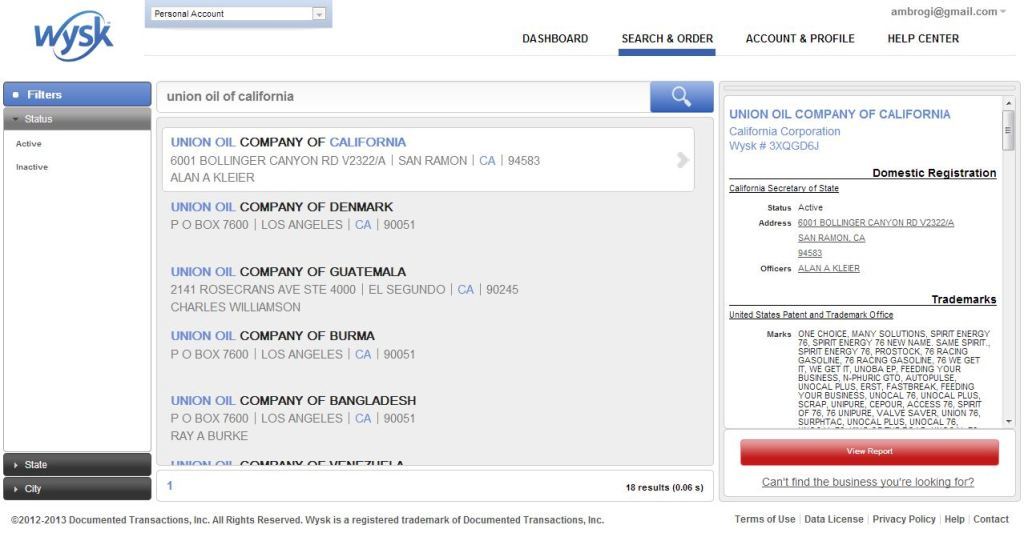A new website founded by a Houston lawyer aims to make it quick and easy to obtain official information about businesses, including business organization filings, certificates of good standing, UCC secured transactions, IRS tax liens, trademarks, bankruptcies and civil litigation. Called Wysk.com, the site allows you to search for a business and obtain basic information about it for free or get a detailed report for $20.
Wysk’s founder, Shahin “Sean” Jamea, tells me that Wysk buys its data directly from secretaries of state and currently covers over 15 million businesses. “We compete directly with the business public data portion of Lexis and Westlaw,” he says.
For the most part, the data you can obtain through Wysk (the name is based on the acronym “what you should know”) is already available through state public-records sources. But tracking it all down can be tedious and time-consuming, requiring you to go from state to state and sometimes to multiple sources within a state. Even then, not all of these records are available online.
With Wysk, simply enter a query for a business name, an officer name, or a business address. A list of matches appears in the center of your screen. A pane to the left lets you filter results by business status (active or inactive), state and city. Select any match and a summary of its filing information appears in a pane to the right, showing domestic registrations, trademarks and foreign registrations.
That much you get for free. For more detailed information, you click the button, “View Report.” That gives you the option of ordering a full business report for $20. The full report (which you receive as a PDF) includes the company name, city, state, Wysk ID number, business type, trade names, old legal names, and other public data available from government sources such as formation information, good standing status, secured transactions, and federal tax lien notices. These reports do not simply summarize this information, but provide the full documents. (Here is a sample business report.)
Notably, Wysk is transparent about the sources of its data and when the data was last updated. For each type of information provided in the business report, Wysk identifies where it came from and when it was updated. Thus, for example, a business registration from California would show that it came from the California Secretary of State and that the data was last updated on July 12, 2013.
Litigation Reports
Also available are litigation and bankruptcy add-ons, each for an added fee of $5:
- State civil litigation. The company’s civil litigation history for a selected state. This includes the court where the case was filed, the date the case was filed, the participants, and the nature of the suit.
- Federal civil litigation. The company’s federal civil litigation history, including the court where the case was filed, the date the case was filed, the participants, and the nature of the suit.
- Bankruptcy. A history of the company’s bankruptcy filings. This includes the court where the case was filed, the date the case was filed, and the nature of the case.
Coverage
Currently, Wysk’s business reports cover only eight states: California, Delaware, Florida, Nevada, Tennessee, Texas, Washington and Wisconsin. Jamea tells me that by the end of August, Wysk will cover a total of 42 states.
With regard to litigation, the federal reports cover all federal district and appellate courts in the U.S. Coverage of the state litigation report varies by state. The site promises that a complete coverage and data-availability map is “coming soon.”
Bottom Line
Jamea positions his company as competing against services such as LexisNexis Accurint, Wolters Kluwer CT Lien and, to a lesser degree, Dun & Bradstreet. None of these list their pricing on their websites, but it is a safe guess that Wysk is cheaper. Also, none align exactly with Wysk in the information it provides. Jamea maintains that the sources of his data and his transparency about those sources makes his information superior to what is available elsewhere.
A more comparable site in terms of pricing is KnowX, where you can run a basic business search for $24.95. Unfortunately, KnowX can be confusing to use in terms of figuring out exactly which reports to order and what you’ll get in those reports. As far as I can tell, the KnowX basic business search is not as comprehensive as is Wysk’s and does not include, among other things, foreign registrations. It seems to me that one would have to order multiple types of reports on KnowX to obtain the same information Wysk provides.
A major advantage Wysk offers over other public-records sources is its simplicity. Searching Wysk is as easy as entering a query just as you would on Google. If you do not know the businesses precise registration name, you will still be able to find it. Once you find the right business, the unique ID number that Wysk assigns it ensures you will find all related documents, even when they contain variations on the name.
The biggest drawback to Wysk right now is its limited coverage. However, if it lives up to its promise of expanding to 42 states by early fall, it should become a key source for business information.
 Robert Ambrogi Blog
Robert Ambrogi Blog